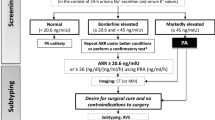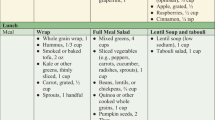Abstract
Therapeutic treatment of hypertension has been achieved successfully with both pharmacologic and nonpharmacologic interventions. Clinical trials have shown that various approaches to treatment result in different levels of blood pressure reduction as well as varying effects on quality of life. Standardizing the approach to measuring quality of life would be beneficial to the assessment of treatment outcomes in hypertension trials. This article reviews some of the strengths and weaknesses of both pharmacologic and nonpharmacologic treatments of hypertension, with special emphasis placed on effects of quality of life.
Similar content being viewed by others
References and Recommended Reading
Williams G: Assessing patient wellness: new perspectives on quality of life and compliance. Am J Hypertens 1998, 11:186S-191S. A good paper comparing pharmacologic therapies, emphasizing the importance of including QL measures in assessing effectiveness. It is somewhat of a clinician’s "call-to-arms" for making use of QL tools.
Burt VL, Whelton P, Roccella EJ, et al.: Prevalence of hypertension in the US adult population. Results from the Third National Health and Nutrition Examination Study, 1988–1991. Hypertension 1995, 25:305–313.
Joint National Committee on Prevention Detection Evaluation and Treatment of High Blood Pressure: The Sixth Report of the Joint National Committee on Prevention, Detection, Evaluation, and Treatment of High Blood Pressure. Arch Intern Med 1997, 157:2413–2446.
Stamler J, Stamler R, Neaton J: Blood pressure, systolic and diastolic, and cardiovascular risks: US population data. Arch Intern Med 1993, 153:598–615.
Testa M: Methods and applications of quality-of-life measurement during antihypertensive therapy. Curr Hypertens Rep 2000, 2:530–537. A very good article that covers a history of QL measures and antihypertensive therapy. It also provides conceptual models of adherence and QL assessment.
Nelsen L, Himmelberger D, Morrison A, et al.: Quality-of-life questionnaire for patients taking antihypertensive medication. Clin Ther 1999, 21:177–183.
Adverse reactions to bendrofluazide and propanolol for the treatment of mild hypertension: report of Medical Research Council Working Party on Mild to Moderate Hypertension. Lancet 1981, 2:539–543.
Solomon S, Hotchkiss E, Saravay S, et al.: Impairment of memory function by antihypertensive medication. Arch Gen Psychiatry 1983, 40:1109–1112.
Hunt S: Quality of life claims in trials of anti-hypertensive therapy. Qual Life Res 1997, 6:185–191.
Hjemdahl P, Wiklund I: Quality of life on antihypertensive drug therapy: scientific end-point or marketing exercise? J Hypertens 1992, 10:1437–1446.
Haynes R, Sackett D, Taylor D: Increased absenteeism from work after detection and labeling of hypertensive patients. N Engl J Med 1978, 299:741–744.
Hollenberg N, Testa M, Williams G: Quality of life as a therapeutic end-point: an analysis of therapeutic trials in hypertension. Drug Saf 1991, 6:83–93.
Os I: Quality of life in hypertension. J Hum Hypertens 1994, 8(Suppl 1):S27-S30.
Hatton D, Haynes R, Oparil S, et al.: Improved quality of life in patients with generalized cardiovascular metabolic disease on a prepared diet. Am J Clin Nutr 1996, 64:935–943.
Plaisted C, Lin P-H, Ard J, et al.: The effects of dietary patterns on quality of life: a substudy of the Dietary Approaches to Stop Hypertension trial. J Am Diet Assoc 1999, 99(Suppl):S84-S89.
McInnes G: Integrated approaches to management of hypertension: promoting treatment acceptance. Am Heart J 1999, 138:S252-S255. A good article that looks at a variety of variables that affect patient acceptance of treatment. The author makes a case for referring to patient concordance, as opposed to compliance. However, the trials cited are pharmacologic studies.
Grimm R: Antihypertensive treatment comparison trials: quality-of-life effects. In Hypertension Primer. Edited by Izzo J, Black H. Dallas: American Heart Association; 1993:202–204.
Bulpitt C, Dollery C, Carne S: Change in symptoms of hypertensive patients after referral to hospital clinic. Br Heart J 1976, 38:121–128.
Bergner M, Bobbitt R, Carter W, et al.: The Sickness Impact Profile: development and final version of a health status measure. Med Care 1981, 19:787–805.
Bulpitt C: Quality of life as an outcome measure. Postgrad Med J 1997, 73:613–616.
Ware J, Snow K, Kosinski M, et al.: SF-36 Health Survey Manual and Interpretation Guide. Boston: New England Medical Center; 1993.
Halbert J, Silagy C, Finucane P, et al.: Physical activity and cardiovascular risk factors: Effect of advice from an exercise specialist in Australian general practice. Med J Aust 2000, 173:84–87.
Grimm RH Jr, Grandits GA, Cutler JA, et al.: Relationships of quality-of-life measures to long-term lifestyle and drug treatment in the Treatment of Mild Hypertension Study. Arch Intern Med 1997, 157:638–648.
Hansson L, Zanchetti A, Carruthers SG, et al.: Effects of intensive blood pressure lowering and low-dose aspirin in patients with hypertension: principal results of the Hypertension Optimal Treatment (HOT) randomised trial. Lancet 1998, 351:1755–1762.
Hansson L, Zanchetti A, for the HOT Study Group: The Hypertension Optimal Treatment (HOT) study: 24-month data on blood pressure and tolerability. Blood Press 1997, 6:313–317.
Myers M: Compliance in hypertension: why don’t patients take their pills? Can Med Assoc J 1999, 160:64–65.
Stamler R, Stamler J, Grimm R: Nutritional therapy for high blood pressure: final report of a four-year randomized controlled trial: the Hypertension Control Program. JAMA 1987, 257:1484–1491.
Whelton P, Kumanyika S, Cook N, et al.: Efficacy of nonpharmacologic interventions in adults with high-normal blood pressure: results from phase 1 of the Trials of Hypertension Prevention. Am J Clin Nutr 1997, 65(Suppl):652S-660S.
Hollenberg N, Williams G, Anderson R: Medical therapy, symptoms, and the distress they cause. Arch Intern Med 2000, 160:1477–1483.
Working Group on Primary Prevention of Hypertension: Report of the National High Blood Pressure Education Program Working Group on Primary Prevention of Hypertension. Arch Intern Med 1993, 153:186–208.
Barr S, McCarron D, Heaney R, et al.: Effects of increased consumption of fluid milk on energy and nutrient intake, body weight, and cardiovascular risk factors in healthy older adults. J Am Diet Assoc 2000, 100:810–817.
Fuster V, Pearson T: 27th Bethesda Conference: matching the intensity of risk factor management with the hazard for coronary disease events, September 14–15, 1995. J Am Coll Cardiol 1996, 27:957–1047.
Kokkinos P, Papademetriou V: Exercise and hypertension. Coronary Artery Dis 2000, 11:99–102.
Metz J, Stern J, Kris-Etherton P, et al.: A randomized trial of improved weight loss with a prepared meal plan in overweight and obese patients. Arch Intern Med 2000, 160:2150–2158.
Joint National Committee on Detection Evaluation and Treatment of High Blood Pressure: The Fifth Report of the Joint National Committee on Detection, Evaluation, and Treatment of High Blood Pressure. Arch Intern Med 1993, 153:154–183.
Appel L, Moore T, Obarzanek E, et al.: A clinical trial of the effects of dietary patterns on blood pressure. N Engl J Med 1997, 336:1117–1124.
Sacks F, Svetkey L, Vollmer W, et al.: Effects on blood pressure of reduced dietary sodium and the Dietary Approaches to Stop Hypertension (DASH) diet. DASH-Sodium Collaborative Research Group. N Engl J Med 2001, 344:3–10.
Kumanyika S, Hebert P, Cutler J, et al.: Feasibility and efficacy of sodium reduction in the Trials of Hypertension Prevention, Phase 1. Hypertension 1993, 22:502–512.
Stevens V, Corrigan S, Obarzanek E, et al.: Weight loss intervention experience in Phase 1 of the Trials of Hypertension Prevention. Arch Intern Med 1993, 153:849–858.
Cook N, Kumanyika S, Cutler J: Effect of change in sodium excretion on change in blood pressure corrected for measurement error. The Trials of Hypertension Prevention, Phase I. Am J Epidemiol 1998, 148:431–444.
Stevens V, Obarzanek E, Cook N, et al.: Long-term weight loss in blood pressure: results of the Trials of Hypertension Prevention, Phase II. Ann Intern Med 2001, 134:1–11.
Anderson R, Hogan P, Appel L, et al.: Baseline correlates with quality of life among men and women with medication-controlled hypertension: The Trial of Nonpharmacologic Interventions in the Elderly (TONE). J Am Geriatr Soc 1997, 45:1080–1085.
Whelton P, Bahnson J, Appel L, et al.: Recruitment in the Trial of Nonpharmacologic Intervention in the Elderly. J Am Geriatr Soc 1997, 45:185–193.
Appel L, Espeland M, Whelton D, et al.: Trial of Non-Pharmacological Intervention in the Elderly (TONE): design and rationales of a blood pressure control trial. Ann Epidemiol 1995, 5:119–129.
Whelton PK, Appel LJ, Espeland MA, et al.: Sodium reduction and weight loss in the treatment of hypertension in older persons: A randomized controlled Trial of Nonpharmacologic Interventions in the Elderly (TONE). JAMA 1998, 279:839–846.
Pandya D, Vyas V, Vyas S: Mind-body therapy in the management and prevention of coronary disease. Comprehensive Ther 1999, 25:283–293. This excellent article provides interesting updates on yoga and other meditation-based activities for reducing stress and lowering blood pressure. It provides extensive information on benefits for physical health, mental health, and overall QL.
Fletcher A: Quality of life in the management of hypertension. Clin Exp Hypertens 1999, 21:961–972. This article looks at QL in various antihypertensive drug trials. The author provides a table of comparison similar to our Table 2.
Traeden U, Holm L, Sandstrom B, et al.: Effectiveness of a dietary intervention strategy in general practice: Effects on blood lipids, health and well-being. Public Health Nutr 1998, 1:273–281.
McCarron D, Oparil S, Resnick L, et al.: Comprehensive nutrition plan improves cardiovascular risk factors in essential hypertension. Am J Hypertens 1998, 11:31–40.
Author information
Authors and Affiliations
Rights and permissions
About this article
Cite this article
Roel, J.P., Hildebrant, C.L. & Grimm, R.H. Quality of life with nonpharmacologic treatment of hypertension. Current Science Inc 3, 466–472 (2001). https://doi.org/10.1007/s11906-001-0008-8
Issue Date:
DOI: https://doi.org/10.1007/s11906-001-0008-8




